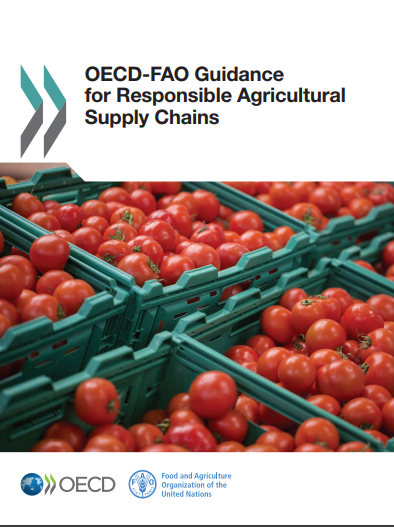The OECD-FAO Guidance for Responsible Agricultural Supply Chains (the Guidance) has been developed to help enterprises observe existing standards for responsible business conduct along agricultural supply chains. These standards include the OECD Guidelines for Multinational Enterprises, the Principles for Responsible Investment in Agriculture and Food Systems, and the Voluntary Guidelines on the Responsible Governance of Tenure of Land, Fisheries and Forests in the Context of National Food Security. Observing these standards helps enterprises mitigate their adverse impacts and contribute to sustainable development.
The Guidance targets all enterprises operating along agricultural supply chains, including domestic and foreign, private and public, small, medium and large-scale enterprises. It covers agricultural upstream and downstream sectors from input supply to production, post-harvest handling, processing, transportation, marketing, distribution and retailing. Several areas of risk arising along agricultural supply chains are addressed: human right, labour rights, health and safety, food security and nutrition, tenure rights over and access to natural resources, animal welfare, environmental protection and sustainable use of natural resources, governance, and technology and innovation.
The Guidance comprises four sections:
• a model enterprise policy outlining the standards that enterprises should observe to build responsible agricultural supply chains
• a framework for risk-based due diligence describing the five steps that enterprises should follow to identify, assess, mitigate and account for how they address the adverse impacts of their activities
• a description of the major risks faced by enterprises and the measures to mitigate these risks
• guidance for engaging with indigenous peoples.
The Guidance was developed by OECD and FAO through a two-year multi-stakeholder process. It was approved by the OECD Investment Committee, the OECD Committee for Agriculture, and the Cabinet of FAO Director-General. A Recommendation on the Guidance was adopted by the OECD Council on 13 July 2016. While not legally binding, the Recommendation reflects the common position and political commitment of OECD members and non-member adherents.
The OECD has also developed tailored guidance to help enterprises build responsible supply chains in other sectors, specifically: extractives, and particularly minerals from conflict-affected and high-risk areas; garment and footwear; and finance.

